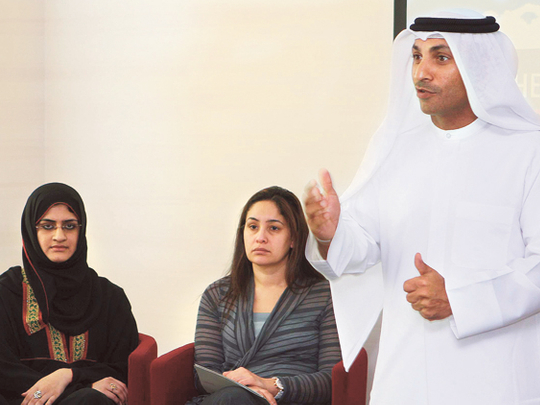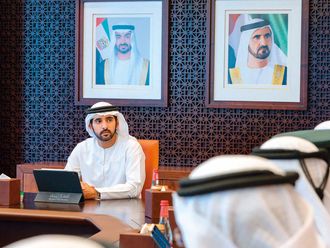
If the point of studying for a degree is to get a good job, then it may seem logical that students in Dubai will want courses in construction, tourism, hospitality and perhaps medicine, to improve their prospects.
In fact, 40 per cent of the 43,212 students currently studying in Dubai are reading business. Among Emiratis, the figure is even higher, with 55 per cent of Emirati students on business courses. Education experts say it is the students who are continuing to push demand in this area.
In the meantime, 26 per cent of UAE employers with jobs to offer are currently looking for candidates with engineering degrees, while only 9 per cent of Dubai’s undergraduates are studying engineering.
Heriot-Watt University Dubai is the local campus of one of Scotland’s most prestigious universities and world-famous for its engineering courses. Even so, 35 per cent of its Dubaibased students are studying business. Vice-Principal Prof. Ammar Kaka says, “When we first talked about coming to Dubai to set up our campus it was for engineering. It is demand, not a supply problem. So many students are studying business because they want to, although I am seeing a growth in engineering studies over the past two years.”
A high number of business degrees in Dubai are at Master’s level, and this is because many students have come to Dubai to work in a wide variety of fields, and take a further degree while they are here.
Dr Warren Fox, Executive Director of Higher Education at the Knowledge and Human Development Authority (KHDA), says, “They are working in hotels, construction, perhaps for the Metro or some other transportation, in finance or banking, and take the opportunity to get a Master’s degree while they are here.”
Cultural significance
Ehsan Razavizadeh, Regional Director of Cass Business School, based in Dubai International Financial Centre, has a list of reasons why students are demanding to study business, and it reflects a cultural shift in the region. “One is the region’s young population and demographics,” he says. “Also included are the need to create more jobs through small and medium-sized enterprises (SMEs), the growth in GDP in the region, the need to diversify and the need to transform traditional family or SME businesses into global players and deal with the international business community.”
Razavizadeh even thinks that Dubai may need more business studies courses. “Given Dubai’s role as the regional hub, I think there is still room for setting up high-quality specialised business and management programmes here. This will also provide more choices for prospective students,” he says.
As far as job opportunities go, there is plenty of room for optimism in the UAE. According to Lama Ataya, Chief Marketing Officer at recruitment company Bayt. com, 63 per cent of employers in the UAE are looking to hire this year. Lama says, “The UAE has seen a marked increase in the past decade in investment in education infrastructure. There has been a sharp rise in choice in terms of top calibre universities and higher learning institutions available in the UAE.
“They have become ideal hunting grounds for employers looking to hire at the entry level and even the intermediate level in the case of graduate degrees, across a wide array of professions and industries. We receive positive feedback from employers who hire top talent from these institutions.”
Home-grown approach
The news according to Ataya is particularly good for Emirati jobseekers; one in three of the UAE’s employers that were surveyed recently said they want to hire more Emiratis in the coming year. This home-grown approach to supplying the workforce with a local population educated in Dubai now includes other nationalities whose families
have settled in the UAE.
Although 43 per cent of students are Emirati, a substantial 22 per cent — or one in five — are Asian. Prof. Kaka at Heriot-Watt says, “The majority of our students are expatriates who live in Dubai, and many were born here. Only 10 per cent come from overseas.”
At present, 1 per cent of Dubai’s students is studying tourism or hospitality, 3 per cent health and medicine, 2 per cent architecture and construction, and 1 per cent education (only three of whom are male Emiratis). Dr Fox says: “We don’t have any absolute quotas, but what we certainly have in mind is to help the balance of programmes in Dubai.”
However, back at Cass Business School, Razavizadeh has some down-to-earth advice for young people confused about which subject to study. He says: “In my view, everyone needs to study whatever he/she really likes and has a passion for. You can be a good artist, dentist, pilot or IT expert but understand the business and management world as well.”












